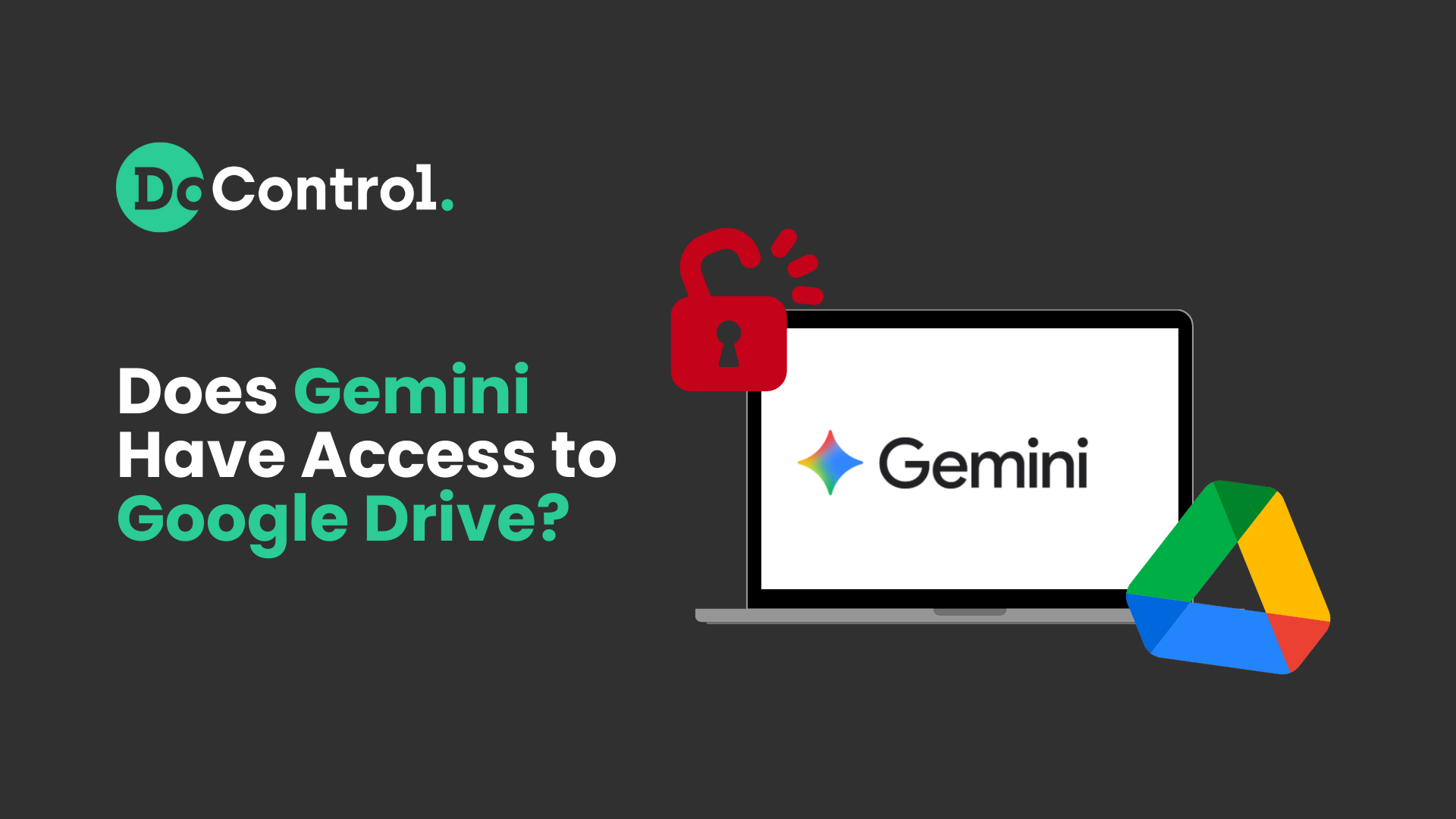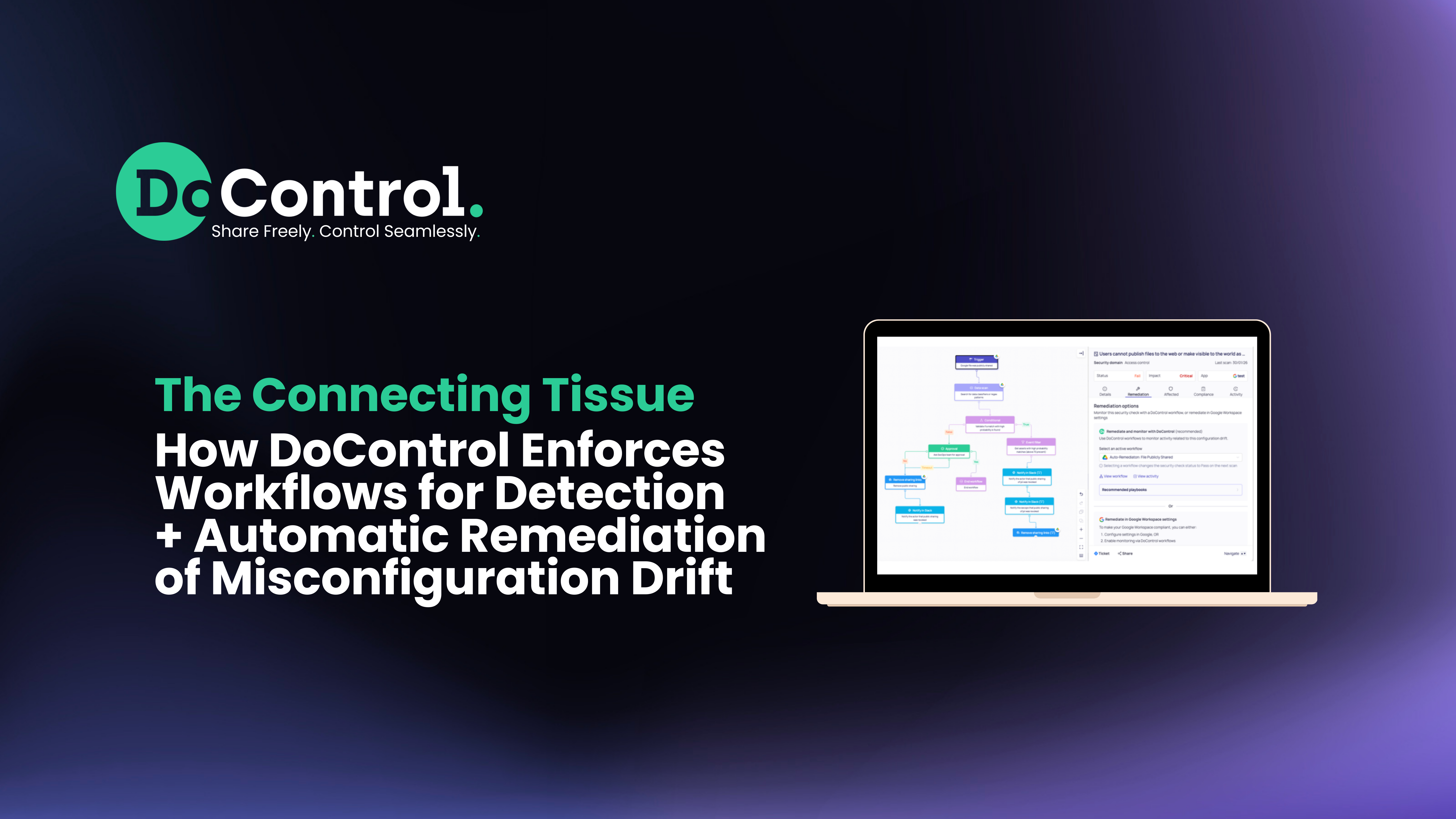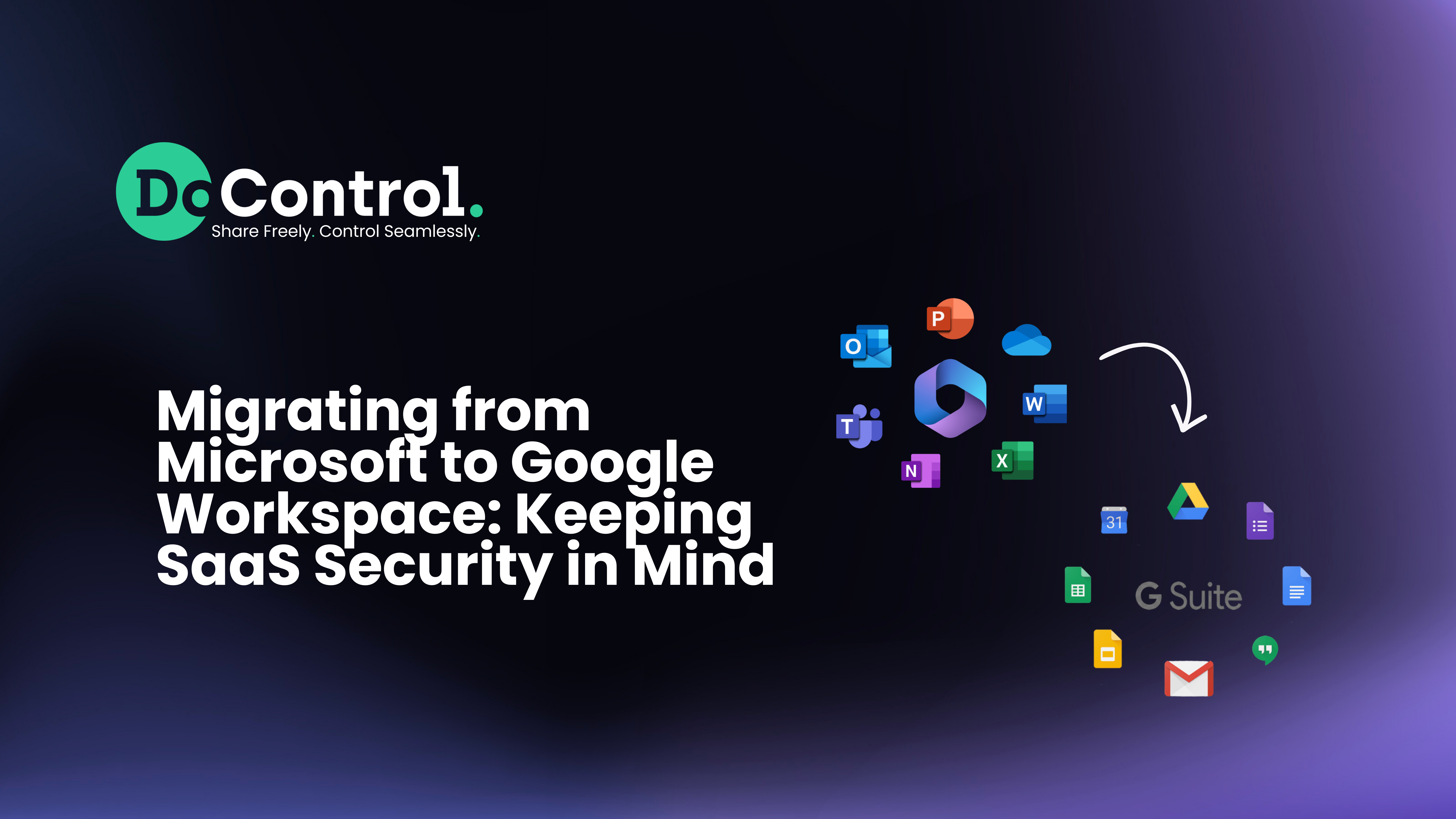
If you’re asking yourself, “Does Gemini have access to my Google Drive?”, you’re not alone. With Google rapidly rolling out Gemini, its generative AI assistant embedded across Google Workspace, security leaders and IT admins are rightly concerned about how this technology interacts with sensitive business data stored in Drive.
Google Drive is the backbone of collaboration for millions of organizations worldwide. Now, with Gemini deeply integrated into Workspace, the line between productivity and privacy is more blurred than ever.
While the promise of AI-driven insights, document drafting, and smart search is enticing, these capabilities inevitably raise important questions:
- How much access does Gemini really have to the files in Google Drive?
- What risks should enterprises consider when enabling AI across their Workspace environments?
- And most importantly, how can security teams maintain visibility and control without slowing down the business?
In this article, we’ll break down what security professionals need to know about Gemini’s role in Google Drive, the risks it introduces, and the best practices - including how DoControl helps organizations protect their most sensitive data from AI-related exposure.
What Is Gemini in Google Workspace?
Gemini is Google’s generative AI assistant, built directly into Google Workspace applications such as Gmail, Docs, Sheets, Meet - and most importantly, Google Drive. Instead of being a standalone tool, Gemini lives inside the apps your teams use every day, helping draft content, summarize information, surface insights, and even automate workflows.
In Google Drive, Gemini can:
- Summarize lengthy documents so users don’t need to read every detail.
- Help locate files faster by understanding natural-language queries.
- Draft and refine new documents based on Drive content.
For employees, this is a major boost in productivity. Instead of searching through folders, they can ask Gemini to “find the Q4 financial forecast” or “summarize last year’s SOC 2 compliance report.”
But here’s the security tradeoff: for Gemini to function effectively, it requires access to the data stored in Google Drive. That means AI models are processing (and in some cases, learning from) sensitive business information.
For organizations in regulated industries or those handling intellectual property, this integration raises critical questions around data governance, privacy, and control.
Gemini is not just another add-on app - it’s embedded into the Google Workspace fabric. That makes it powerful, but it also makes it harder for admins to control where data flows, how it’s used, and whether sensitive files are inadvertently exposed.
Does Gemini Really Access Your Google Drive Data?
The short answer is: yes, Gemini can access files in Google Drive - but the extent depends on your organization’s configuration and how employees interact with the tool.
How Gemini Reads and Processes Files in Drive
When users ask Gemini a question, request a summary, or prompt it to draft content, the AI must scan the relevant files within Google Drive to provide a response. This means that documents, spreadsheets, and even presentations can be ingested for processing in real time.
While Google has stated that Gemini is designed with security in mind, the reality is that the AI still needs to touch sensitive data to generate outputs.
For companies storing confidential contracts, customer records, financial data, or regulated information, this presents new risks.
Data Types at Risk: PII, Intellectual Property, and Sensitive Files
It’s not just “harmless” content that Gemini may interact with. Examples of high-risk exposure include:
- Personally Identifiable Information (PII) - names, addresses, SSNs, phone numbers.
- Protected Health Information (PHI) - medical records, clinical notes, patient data.
- Intellectual Property - product roadmaps, source code, customer data, trade secrets.
- Compliance Documentation - SOC 2 reports, audit evidence, regulatory filings.
What Google Says vs. What Security Teams Need to Know
Google emphasizes that Gemini is not “training” its models on your enterprise data in the same way public AI systems might. However, the concern for security professionals is not necessarily model training - it’s data exposure, over-permissioning, and loss of visibility.
If Gemini can pull from a file buried deep in Drive, admins and security teams NEED to know exactly who else has access to those files, how long that access persists, and whether sensitive data is being surfaced where it shouldn’t be.
For example, consider a document titled “Q4 Revenue Projections” that’s shared with the setting “Anyone with the link can access.” A junior analyst using Gemini can easily search for something, find it, and open it.
Before Gemini, that file might have remained buried in a folder, unlikely to be noticed. But with Gemini, existing security gaps are magnified - misconfigured sharing settings and weak controls become easier to exploit and harder to ignore.
{{cta-1}}
The Security and Compliance Risks of AI in Google Drive
While Gemini offers clear productivity benefits, its integration with Google Drive introduces new risks for data security, compliance, and governance. For security teams, these risks are daunting.
Data Privacy Concerns with Generative AI
Every interaction with Gemini is powered by data - and that means sensitive business files may be processed by AI models.
Even if Google promises enterprise-grade safeguards, the simple fact remains: the more systems that touch your data, the greater the risk of unintended exposure.
For organizations storing confidential IP or regulated data in Google Drive, Gemini effectively becomes another layer of access that must be monitored and controlled.
Compliance Implications (GDPR, HIPAA, SOC 2, + More)
Regulatory frameworks like GDPR, HIPAA, and SOC 2 hold organizations accountable for how data is accessed, processed, and retained. If Gemini accesses a file containing personal data or protected health information, enterprises need to ask:
- Was that access logged?
- Can it be audited?
- Do we have full visibility into how the data was used?
Without affirmative answers, organizations risk compliance violations - even if they didn’t “intentionally” expose the data.
Shadow AI and the Rise of Unmonitored Data Exposure
One of the fastest-growing threats in SaaS environments is shadow AI - when employees use generative AI tools in ways that IT and security teams cannot fully see or control.
With Gemini embedded directly into Workspace, it’s easy for well-meaning employees to unknowingly expose sensitive information. A simple request like “Summarize our client contract” could surface confidential details in places they shouldn’t appear.
Another high-risk scenario arises during a takeover. If Gemini itself is breached - or if an attacker gains access through a third party (which is the most common cause of high-profile breaches in 2025) - the Gemini agent could modify files, share them with whoever they want, or even delete critical data.
Without strong governance and visibility into Google Workspace security (which Google does not natively provide), the risks become enormous, and most likely they’ll become headlines.
For CISOs, compliance officers, and IT admins, this creates a visibility gap: Gemini is powerful, but without proper controls, it can also become a silent source of data leakage.
Best Practices for Securing Google Drive in the Age of Gemini
Gemini’s integration into Google Workspace is here to stay. The question for security leaders is not whether to use it, but how to manage the risks without slowing down productivity. Here are key best practices every organization should implement:
Implement Strong Data Loss Prevention (DLP) Policies
Generative AI thrives (and only works) when it has access to data. This means organizations must put boundaries in place.
Enforce DLP policies to prevent sensitive files, such as those containing PII, PHI, or financial records, from being accessible to Gemini or being shared externally. DLP rules can act as the first line of defense against accidental exposure.
Tighten Access Controls and Monitor Activity Logs
Gemini’s ability to retrieve information is only as secure as your existing Google Drive permissions model.
Unfortunately, across most organizations (especially at the enterprise level) over-permissioning is rampant - with files often shared publicly, even outside the organization.
Why is this? A few reasons: employees don't want to stunt business operations by adding a million sharing approval steps, historical exposure gets forgotten about, and (sadly and in most cases) employees are negligent and simply don't have security in mind when operating in Google Drive.
Security teams should audit sharing settings, enforce least-privilege access, and regularly review Drive permissions + activity logs to detect anomalous behavior.
Train Employees on Responsible AI Use
Employees are eager to embrace AI for efficiency, but without guidance, they may inadvertently expose sensitive data.
Create AI usage policies that clearly define what data can (and cannot) be processed by Gemini. Teach employees the risks genAI creates in SaaS apps they use every day, and pair policies with regular training to build awareness and accountability.
How DoControl Protects Google Drive from AI and Data Risks
Even with strong policies and vigilant employees, the scale and complexity of Google Workspace (especially for enterprise level companies) make it impossible to manage AI-driven risks manually.
This is where DoControl provides a critical layer of protection that goes far beyond native Google controls or other SaaS security tools.
Automated Data Loss Prevention for Sensitive Files
DoControl’s DLP doesn’t just block access and bring business to a halt - it enables security with granular, context-aware DLP policies. These policies are baked directly into automated workflows, ensuring that sensitive data remains protected without slowing down business operations.
For example, DoControl can enforce a rule via an automated workflow policy that prevents external sharing of financial records, but still allows internal collaboration for the accounting team. This ensures that external collaborators are removed, while the internal employees who need access can keep getting their work done efficiently.
With over 230 pre-built data classifiers, DoControl can detect and act on sensitive information ranging from PII, PHI, financial data, compliance documents, and intellectual property. This precision ensures that only truly risky activity is flagged, while employees can continue doing their jobs seamlessly.
Continuous SaaS Security Posture Management
Many SaaS vendors claim to provide “visibility” into your environment - but visibility without remediation is half a solution. DoControl does both. Not only can security teams see who is accessing what within Google Drive, but they can also take immediate action to remediate risks surfaced by the platform.
This continuous SaaS security posture management means enterprises don’t just have a window into potential threats - they have the governance, automation, and remediation tools needed to actively close security gaps.
Visibility and Control Across Google Workspace Environments
Gemini complicates visibility because its AI-powered functions surface files that employees might not even realize they have access to.
DoControl addresses this by aggregating context from HRIS, IDP, and EDR systems to build a complete picture of each identity and user.
This means activity isn’t analyzed in a vacuum - it’s evaluated against the user’s role, department, typical scope, behavioral patterns, and more.
For example, if a sales rep accesses and downloads a customer contract, DoControl knows that’s business as usual. But, if the same user suddenly tries to access a folder full of source code or export a confidential product roadmap, DoControl identifies it as high-risk behavior.
Why DoControl Is the Trusted Layer of Protection for Gemini Risks
Native Google security features are powerful, but they don’t close all the gaps introduced by Gemini. Similarly, many third-party SaaS data solutions offer monitoring, but lack the granular control and remediation capabilities that enterprises need.
DoControl fills all of the gaps left by other solutions.
By combining deep visibility, real-time monitoring, granular controls, and automated remediation, DoControl ensures that organizations can embrace Gemini’s productivity benefits without compromising data security or compliance.
It’s the trusted protection layer that enables enterprises to balance AI innovation with security control.
Conclusion
While Gemini doesn’t always create new vulnerabilities on its own, it significantly amplifies the impact of those already present.
Misconfigured file sharing, weak access controls, and overlooked governance issues that might once have gone unnoticed are now surfaced and made easier to exploit.
What was buried becomes searchable, and what was obscure becomes accessible.
If Gemini itself were ever breached - or if an attacker gained access through a third party - the consequences could be severe. The agent’s ability to view, modify, share, or even delete files means that a single compromise could cascade into widespread data loss or exposure.
All of these risks are compounded by the lack of native visibility and governance controls within Google Workspace. Modern organizations need a third-party solution that addresses these critical risks, before they become the next brand in headlines.
Gemini is a powerful productivity accelerant, but it can just as easily accelerate damage. This is only the beginning of Gemini’s impact - and it's altering the world of security as we know it.
Want to Learn More?
- See a demo - click here
- Get a FREE Google Workspace Risk Assessment - click here
- See our product in action - click here



.png)